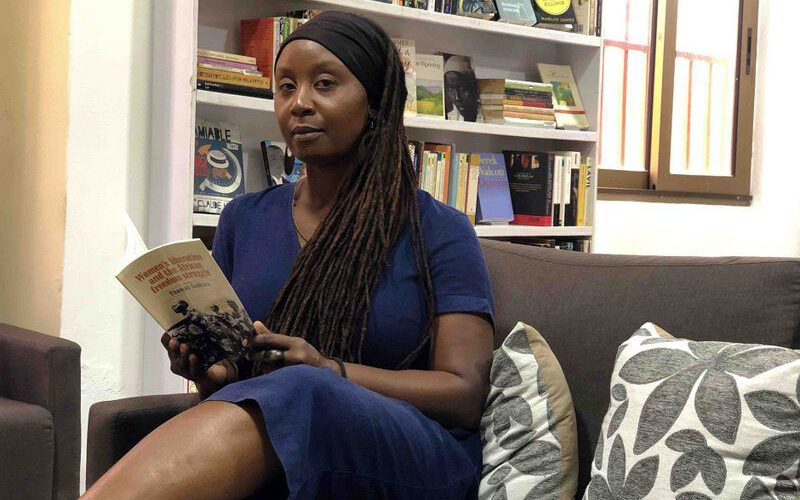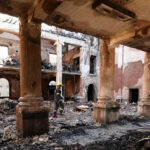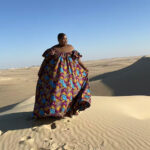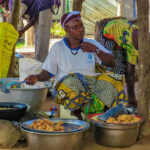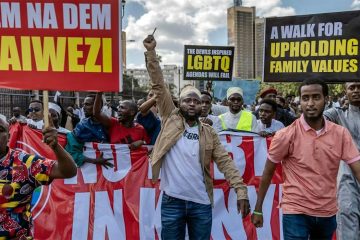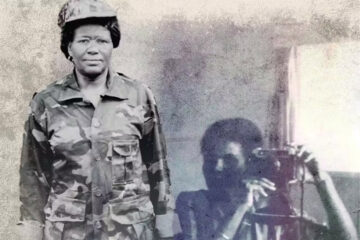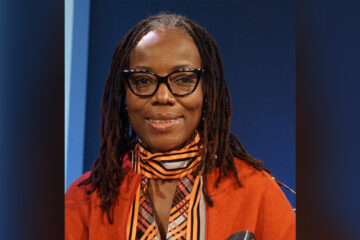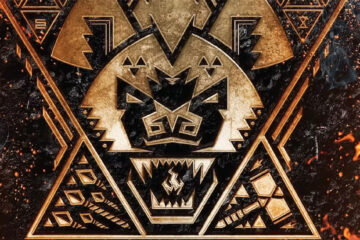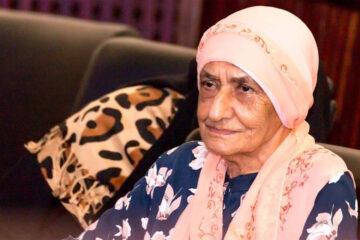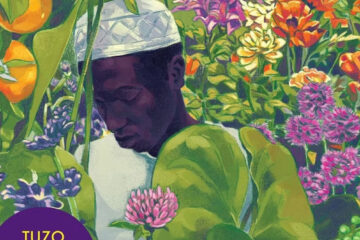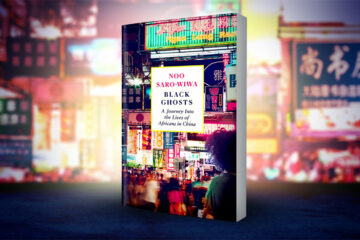LERATO MOGOATLHE, BIRD
NUMBER 4 Portuphy Street in West Legon, Accra, Ghana may look like an ordinary house in the suburb – until you step inside. Crossing the threshold, the one-storey building morphs into a living, breathing vault of stories alive with the potential to transcend the very boundaries of history, geography, and time.
This is the embodiment of one woman’s passion and a dream so big, it spans the whole world.
Welcome to Syliva Arthur’s Library of Africa and the African Diaspora (LOATAD), where even the walls offer a history lesson. Pictures of authors like Kwame Nkrumah, Toni Morrison, Roxane Gay, Alice Walker, Chinua Achebe and Wole Soyinka look back at the visitor, offering more than a library. Rather, this is an offer of a revolution.
The bookshelves house a collection of 4,000 books, stretching from children’s and political literature to Afrofuturism, feminism and post-colonial literature. Some of the books housed here are signed first editions that have become rare and historical collectables.
A collection of the African Writers Series, first published in the 1960’s, for example. Chinua Achebe was the founding editor of the series, a pivotal moment for literature in Africa, as authors wrote books that reflected the end of colonialism and the early years of independence in Africa. Crucially, the series offered work written by Africans for Africa to curriculums in schools and universities across the continent, for the first time.
Like every book in the Special Collections Room, this collection features work “that’s rare, out of print or generally hard to find,” Arthur explains. The oldest book in the library – Lyric of Lowly Life by African American writer Paul Laurence Dunbar – dates back to 1898.
“I’ve always been a reader, since the age of 3, enabled by my parents, in particular my father who would always have newspapers, magazines and news playing in the background. In a sense, I’ve always been a news, information, and book type of person,” Arthur says.
Two experiences watered the seed planted by her childhood in her 20s. Born and raised in London she didn’t even visit Ghana when she was young. Her first trip was in the late 1990s, after completing her first degree.
“I was looking for myself, looking to complete the pieces of me I always felt was incomplete. Being a Black British person, I always felt there was a Ghanaian piece I didn’t quite understand or know,” she says, adding that everything fell into place on this visit. She tried moving to Accra, but the plan didn’t work out. She returned to London, but her heart was in Ghana.
The second experience was moving to Brussels, Belgium, in 2010 for work. Alone in a new city without any social networks, she turned to books for company. Here, she devoured every book she could find written by authors of African descent. For its part, the city became a wonderland.
“Brussels has a European and cosmopolitan demographic. People are there temporarily; it’s very transient.” People who constantly pack their lives into boxes to be shipped worldwide always have something they can’t carry into their next life, including books.”
So the city’s second-hand bookshops became Authur’s second home – and a treasure trove. She found books that were “brand new, spines hardly broken and relatively cheap,” she continues. Instead of selling books that had become too many to be contained by her apartments in London and Brussels, she would ship them to her mother’s house in Kumasi, central Ghana.
Her occasional visits, however, were not doing the collection justice. “I would see all the books sitting there and think it was a waste that they were not read, particularly because they were culturally relevant and contemporary,” she adds.
The idea of opening a library took shape back in 2011, as her collection expanded. “The first place is head to wherever I’m travelling is a bookshop,” she offers.
LOATAD became a reality in 2017 when she moved to Accra full-time. She signed the lease for the library in September and opened its doors three months later. It has 1300 books from her private collection.
Members pay a subscription fee to use the library, a model that keeps the lights on, but doesn’t address the other reason Arthur decided to take her books out of storage boxes and place them on bookshelves. Arthur wants to share her love of African literature well beyond the walls of her library.
“When I first started coming to Ghana, I noticed that there weren’t bookshops in the traditional sense that I’m used to anyway. When you do find them, they tend to sell these cheap, imported books that I would say are cast-offs, but I guess they are bestsellers, like the 10-Day MBA, Lean In and 4-Day Workweek.”
Religious books occupied the other end of the self-help spectrum.
“You will not find contemporary literature. We tend to see reading in Ghana as an academic pursuit that ends once you finish school. We don’t have a market for storybooks.”
The situation is not unique to Ghana, certainly when it comes to finding contemporary literature. Walk into bookshops in Harare, Uganda, Nairobi or Cape Town, and chances are the collection of African writing will be slim. Works by writers of African descent who are not Toni Morrison or Alice Walker can be hard to find. Books by writers of African descent writing in South America and the Caribbean are almost impossible to find.
And yet, Africans on the continent have been reading writing and for thousands of years. The oldest existing university in the world, the University of al-Qarawiyyin in Fez, Morocco, opened in 859 A.D. By the 16th century, Timbuktu in Mali was as noted not only for its trade in gold and salt mines but also for its fine manuscripts – some of which are now as highly regarded from a historical perspective as the Dead Sea Scrolls. Hieroglyphics, used by ancient Egyptians, are considered among the first forms of writing in the history of humanity.
People across the continent, have never – despite upheavals and disruptions including those caused by outside interference – entirely stopped writing and therefore reading. While the Library of Africa and the African Diaspora is not the only space that has such a collection, it is the only one of only a few that provide an accessible, “one-stop-shop” for visitors wanting access to books that essentially capture the collective black experience from the past and present, while also curating the future.
In this regard, the project is a revolution – it is fighting the historical and systemic erasure of the thought and art of Africans. But there’s more to Arthur’s vision…
Through LOATAD, Arthur has devised impact programmes that put books in the hands of children who would otherwise lack access to them. These include “Little Librerias” and “Market Akenkan”.
Little Librerias has already opened two spaces at schools in the Ashanti region, while Market Akenkan provides reading and other cultural activities to the children of market women in Accra. A writing residency explores how Afrofuturism can inspire and stimulate new writing and imagine a new future for African literature, while a digital residency is helping an archivist and librarian to digitalise LOATAD’S collection to enable anyone in the world to access their books. A WomenFest residency supports WomenFest Ghana by documenting and photographing the event. LOATAD is also on Facebook at https://www.facebook.com/loatad.org/
For now, Arthur may not be able to roll the model out further but she’s hoping her model catches on elsewhere.
“I hope we can inspire other people around the continent to create similar libraries and initiatives. There’s a need for these kinds of institutions.”
[origincode_photo_gallery_wp id=”48″]

